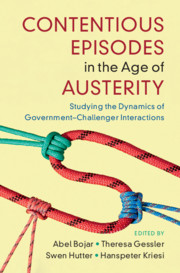 Contentious Episodes in the Age of Austerity
Contentious Episodes in the Age of Austerity Book contents
- Contentious Episodes in the Age of Austerity
- Cambridge Studies in Contentious Politics
- Contentious Episodes in the Age of Austerity
- Copyright page
- Contents
- Figures
- Tables
- Contributors
- Preface
- Part I A New Approach to the Analysis of Contentious Episodes
- 1 Introduction
- 2 Selecting and Coding Contentious Episodes
- 3 The Economic and Political Contexts of the Episodes
- Part II Varieties of Contention
- Part III Dynamics of Interaction
- Part IV Conclusion
- Appendices
- References
- Index
- Series page
2 - Selecting and Coding Contentious Episodes
from Part I - A New Approach to the Analysis of Contentious Episodes
Published online by Cambridge University Press: 05 November 2021
- Contentious Episodes in the Age of Austerity
- Cambridge Studies in Contentious Politics
- Contentious Episodes in the Age of Austerity
- Copyright page
- Contents
- Figures
- Tables
- Contributors
- Preface
- Part I A New Approach to the Analysis of Contentious Episodes
- 1 Introduction
- 2 Selecting and Coding Contentious Episodes
- 3 The Economic and Political Contexts of the Episodes
- Part II Varieties of Contention
- Part III Dynamics of Interaction
- Part IV Conclusion
- Appendices
- References
- Index
- Series page
Summary
As we laid out in the introductory chapter of our volume, we propose a rather ambitious and innovative empirical strategy to study contentious politics – what we label as Contentious Episode Analysis (CEA). Having situated our approach in the intermediate meso-level between the “narrative approach” and the “epidemiological” approach exemplified by conventional protest event analysis (for reviews, see Hutter 2014; Koopmans and Rucht 2002), we aim to accomplish two tasks simultaneously. On the one hand, we wish to preserve the rich ontology and conceptual breadth of the “narrative approach” by distinguishing between a diverse set of actors, actions, and interactions in our empirical design. On the other hand, we aim to leverage the empirical scope and rigor of the “epidemiological approach” of protest event analysis by building a quantitative, cross-national dataset that allows for a variable-based analysis of the unfolding of interactions in contentious episodes. Therefore, in our efforts to preserve the strength (and avoid the weaknesses) of the two extant approaches, the main aim we set forth is to build a dataset that gives an accurate and fine-grained picture of the dynamics of political conflict condensed to a limited set of variables.
- Type
- Chapter
- Information
- Contentious Episodes in the Age of AusterityStudying the Dynamics of Government–Challenger Interactions, pp. 24 - 43Publisher: Cambridge University PressPrint publication year: 2021


